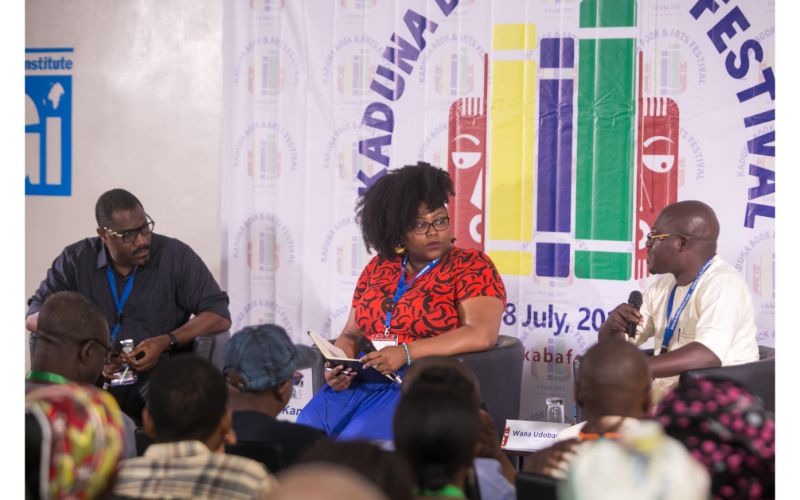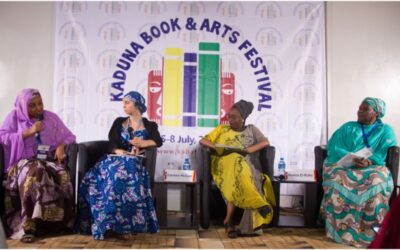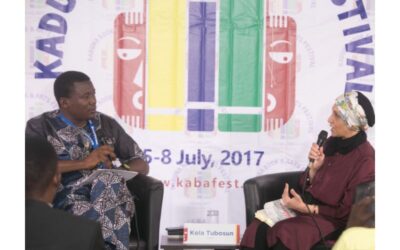Big Cities, Endless Possibilities
Before introducing the writers, the beautiful Wana Udobang highlighted the dangers of a city. She discussed the endless possibilities that made up a city and the thread of love running through both Toni Kan’s Carnivorous City, and Richard Ali’s City of Memories. She was curious and interested in knowing how amidst the chaos, frustrations and crisis sprouting through city streets and nightlife, both writers were able to maintain a love theme. Kan’s baritone boomed through the microphone and filled the room. He noted that there was always space to occupy. And what couldn’t be done in the village could be done in the city because of its seeming anonymity. Love being natural was inevitable especially in a lonely setting, he observed. For him, the need for connection always made love possible despite seeming impossibilities.
“A city is a sort of space that pulls us away from each other,’ responded Ali. Love in a city story would always ravel itself. ‘While the city unravels you,’ Ali said, ‘love anchors you to a place.’ This he noted was because religious, political and ethnic pressures would disenchant the individual, but it would take love to be stable again.
The multilayered history spiraling through writers’ engagements, the ability to write what one pleased while addressing issues with a didactic twist was asked by the moderator. ‘You don’t read my book to learn anything,’ confessed Kan, ‘when I want moral instructions I read the Bible.’ Kan opinionated that books, like movies were engaged for escape. On the other hand, Richard didn’t set out to write nuanced narratives but couldn’t ignore the foreboding issues within his space.
The moderator asked how both writers handled accuracy in writing. Richard clarified his stand by stating that unlike fiction, non-fiction had the burden of veracity. ‘It is in little discussions that truth comes out,’ he said. For Kan, the writer act as a cartographer. Citing an instance in Carnivorous City, he tried to give real street details and the whole book seemed like a love song to Lagos. But he observed that in 4-5 years, cities would change as well as the landmarks and one would be forced to create landmark for he or herself. And when Udobang raised the question of the unexplored layered complexities of cities; Kan is of the view that Lagos for instance stood as the most represented city in all of African cities though the like of Jos, Ibadan and Kaduna couldn’t be erased. ‘You have to understand the city to bring it to life,’ Kan conclude, ‘or your story would be flat.’
‘It’s an issue of certainty being convenient,’ said Ali concerning the issue of veracity in fiction. he discussed the issue of identity politics which could be found in cities despite having lived for years at the sam time, the centre of City of Memories could be locate on the blend of people across religious and ethnic lines. In lending weight to this, Kan emphasized the authenticity of more than novels as oppose to earlier one where everyone character had a Western name and an ethnic one. This was brought about by the relativity of current texts and the contemporary issues being raised.
In discussing the heart of the two books, the moderator asked what were the challenges of the authors in portraying cities as characters. Kan admitted his portrayal came with a failure to capture what he really wanted: Lagos. In trying to avoid making it seem phantasmagoric, he fought his best to be close to the original, the real, while noting Mainland and Island were two different places in same city. Richard Ali on the other hand said capturing the physical wasn’t really what he meditated upon when it came to Jos, city, but the what was lost and the attitude of seeing each others’ humanity through greetings in every situation. At the end he posited that writers actually put characters to live up their fantasies.
There were heated debates during the question and answers forum, however, the question on modern simplicity and old complexity of language was finally addressed by professor E. E. Sule. He asserted that every writing came with a history and language used in the time or history reflected what was the norm, among other intellectual arguments. The engagement with the audience appeared to be one of the most interesting aspects of the forum and the audience didn’t let the heat to cool for a minute till the panel ran out of minutes.
Written By Domnic Aboi


